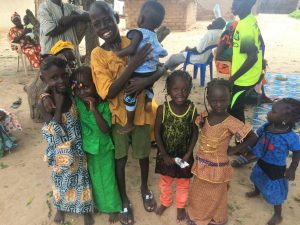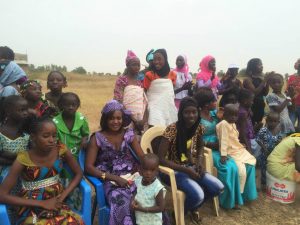This project is made possible through the partnership of WATER CHARITY and the NATIONAL PEACE CORPS ASSOCIATION. ![]()
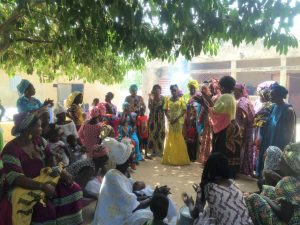 Location
Location
Kamatane, Fatick Region, Senegal
Community Description
The village of Kamatane is located in the region of Fatick in Western Senegal. Kamatane is a diverse village comprised of Sereer, Pulaar, Bambara, and Wolof ethnic groups. There are approximately 1,000 people in Kamatane’s five sublet villages, the largest comprising of 35 compounds and the smallest only 7.
Kamatane houses a health hut (the most grassroots government health structure), a primary school, and a middle school. There are no daily or weekly markets due to geographic distance from paved roads. There is electricity in only one of Kamatane’s sublet villages, and no running water in any. Wells are the primary source of drinking and cooking water for the people of Kamatane.
The economy of Kamatane is primarily agrarian. During the rainy season, men and young boys spend their days in the fields farming millet, corn, peanuts, beans, and watermelon. Due to close proximity to the runoff water of the Saloum Delta, many men also support their families by catching fish, crabs, and shrimp.
The women of the village often grow house vegetables like onions, tomatoes, and okra in community gardens. When not busy assisting with farming, the women take care of the household: they spend the majority of their time cooking, cleaning, and pulling water. Kamatane is a lively village, full of camaraderie, despite its challenges.
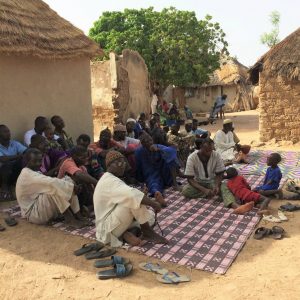 Problem Addressed
Problem Addressed
Access to sanitation is a basic human right. Poor community-wide sanitation and hygiene are the main contributors to four billion cases of diarrheal diseases each year and cause more than 1.5 million deaths annually, mostly among children under five. Furthermore, poor sanitation leads to the heightened transmission of diseases like cholera, typhoid, and hepatitis.
Over half of households in Kamatane have either no latrine or an unsafe latrine (without proper construction or materials). Only 8 households have safe, sanitary, and accessible latrines.
This severe lack of latrines is having serious impacts on the health of community members, particularly children. When surveyed, nearly 70% of households reported having a child with diarrhea in the previous two weeks. Kamatane is in great need of latrines to reduce the high prevalence of diarrheal diseases and to improve its community members’ health statuses.
Project Description
This latrine project aims to build safe and hygienic latrines in 20 households in Kamatane and to improve community members’ hygienic practices through training emphasizing behavior change.
These latrines, made from cement, iron, and gravel, will be constructed by skilled teams of local masons.
Building materials will be funded by Water Charity, and the village will provide additional in-kind materials.
The community has also agreed to pay a 10% monetary contribution, attend multiple preventative health training, and build a handwashing station in each of their households.
The behavior-change focus of the project seeks to reduce the prevalence of diarrheal diseases through improved sanitation and hygiene behaviors, such as proper handwashing at critical times. Local health workers will lead these training to build their capacities and sustain the transfer of knowledge.
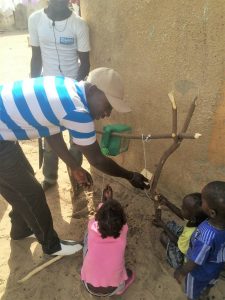 Project Impact
Project Impact
280 people will directly benefit from this project.
Peace Corps Volunteer Directing Project
Elizabeth Shariat Panahi
Monitoring and Maintenance
The project will be overseen by a sanitation and hygiene committee comprised of community health relays, the local health hut committee, and Peace Corps work partners. Participating households and the sanitation and hygiene committee will be trained extensively in latrine care and maintenance. Project monitoring and evaluation with the volunteer’s assistance will range from January to March of 2017.
The sanitation and hygiene committee will be trained to evaluate long-term outcomes of the project after the volunteer’s close of service (COS).
Comments
Approximately 280 people will have access to new or improved sanitation systems, and 20 households will possess handwashing stations. Over 40 caretakers will have adopted a new sanitation or hygiene behavior to prevent illness, and at least 40 community members will be educated on the prevention of common childhood illnesses like diarrhea. Ten local health workers will have improved leadership and training skills.
This project will significantly reduce the number of households that are openly defecating, and the entire village of 1,000 people will be at a lower risk of acquiring diarrheal diseases.
Fundraising Target
$1,900
Donations Collected to Date
$1,900
Dollar Amount Needed
$0 – This project has been funded by an anonymous donor. Additional donations will go to other projects in Senegal.
This project has been completed. To read about the conclusion, CLICK HERE.
